#Socrates is not the father of Philosophy!!!!!!!!!
Video
youtube
Eastern Philosophers vs Western Philosophers. Epic Rap Battles of History
I’ve watched a lot of these, but I can’t believe I’ve missed this one and it is the best one out of all of them easily. I needed a few minutes to clear my eyes from laughing too hard. I have thoughts, but will preserve them in tags.
#epic rap battles of history#erb#firstly let's get right into it#i love the opposition of the philosopher's regarding morals and ethics#and how they turn on one another based on conflict of opinion alone which remains an issue of contention to this day for those learning#love how Nietzche calls Voltaire out for being immoral despite his judging society and the government for being so#and I agree#even if I did love the works of Voltaire myself#can't deny he was a hypocrite in life#he was a lech and scammer#he built his entire status and wealth off of the lottery#by replaying it#that came at the expense of the government#and now for what I disagree with!!!#It's about to get spicy...#Socrates is not the father of Philosophy!!!!!!!!!#I told you#It's going to get spicy and it's Thales if you want a name#since a lot of Pre-Socratic Philosopher's didn't properly document their ideologies and my next take is that Sun Tzu wouldn't have#supported Military Force#He wasn't aggressive#so take this video with a grain of salt#best part of it for me?#when Nietzsche spelled out his last name#like I already messed that name up myself in tags earlier
20 notes
·
View notes
Text
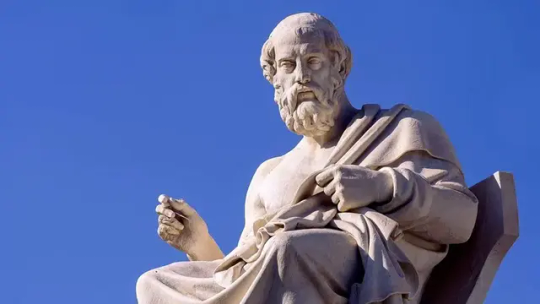
Herculaneum Scrolls Reveal Plato's Burial Place
Researchers used AI to decipher an ancient papyrus that includes details about where Greek philosopher is buried.
The decipherment of an ancient scroll has revealed where the Greek philosopher Plato is buried, Italian researchers suggest.
Graziano Ranocchia, a philosopher at the University of Pisa, and colleagues used artificial intelligence (AI) to decipher text preserved on charred pieces of papyrus recovered in Herculaneum, an ancient Roman town located near Pompeii, according to a translated statement from Italy's National Research Council.
Like Pompeii, Herculaneum was destroyed in A.D. 79 when Mount Vesuvius erupted, cloaking the region in ash and pyroclastic flows.
One of the scrolls carbonized by the eruption includes the writings of Philodemus of Gadara (lived circa 110 to 30 B.C.), an Epicurean philosopher who studied in Athens and later lived in Italy. This text, known as the "History of the Academy," details the academy that Plato founded in the fourth century B.C. and gives details about Plato's life, including his burial place.


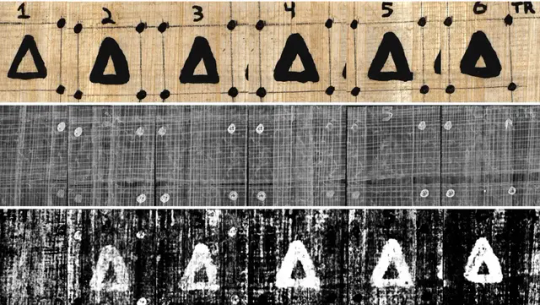
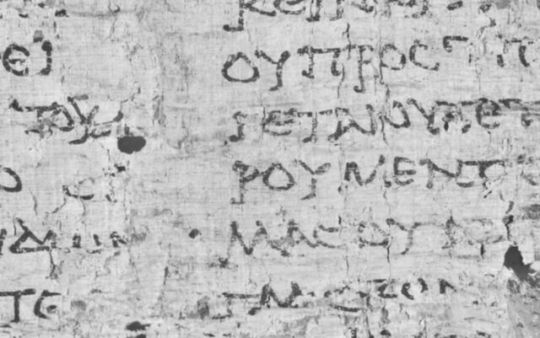
Historians already knew that Plato, the famous student of Socrates who wrote down his teacher's philosophies as well as his own, was buried at the Academy, which the Roman general Sulla destroyed in 86 B.C. But researchers weren't sure exactly where on the school's grounds that Plato, who died in Athens in 348 or 347 B.C., had been laid to rest.
However, with advances in technology, researchers were able to employ a variety of cutting-edge techniques including infrared and ultraviolet optical imaging, thermal imaging and tomography to read the ancient papyrus, which is now part of the collection at the National Library of Naples.
So far, researchers have identified 1,000 words, or roughly 30% of the text written by Philodemus.
"Among the most important news, we read that Plato was buried in the garden reserved for him (a private area intended for the Platonic school) of the Academy in Athens, near the so-called Museion or sacellum sacred to the Muses," researchers wrote in the statement. "Until now it was only known that he was buried generically in the Academy."



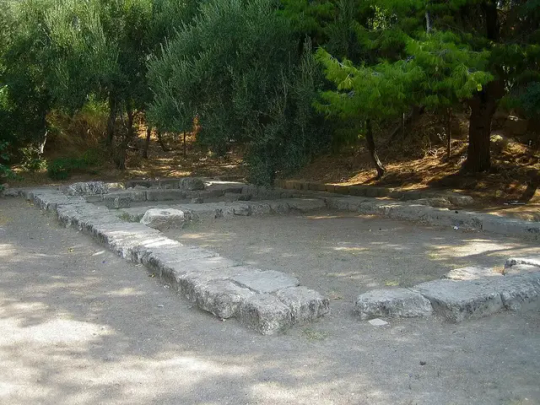
The text also detailed how Plato was "sold into slavery" sometime between 404 and 399 B.C. (It was previously thought that this occurred in 387 B.C.)
Another part of the translated text describes a dialogue between characters, in which Plato shows disdain for the musical and rhythmic abilities of a barbarian musician from Thrace, according to the statement.
This isn't the first time that researchers have used AI to read ancient scrolls that survived Mount Vesuvius's eruption. Earlier this year, researchers deciphered a different scroll that was charred during the volcanic eruption at a nearby villa that once belonged to Julius Caesar's father-in-law.
By Jennifer Nalewicki.
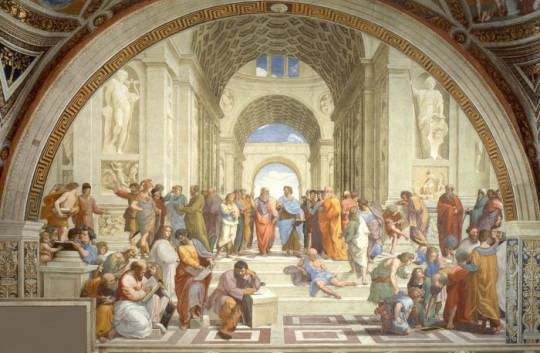
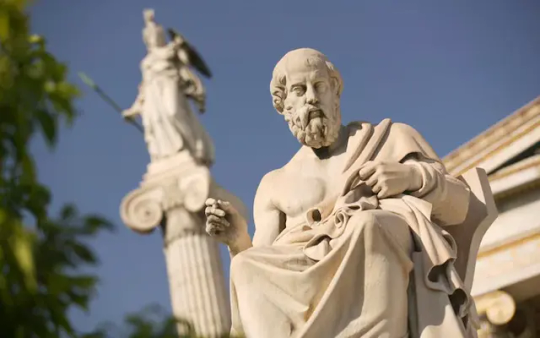
#Plato#Herculaneum Scrolls Reveal Plato's Burial Place#Herculaneum#Pompeii#Philodemus of Gadara#History of the Academy#The Academy#Plato's Academy#the Platonic Academy#the Academic School#athens greece#mount vesuvius#roman dictator sulla#ancient texts#ancient artifacts#archeology#archeolgst#history#history news#ancient history#ancient culture#ancient greece#greek history#roman history#roman empire
75 notes
·
View notes
Text
EUCLID ANALYSIS.
Told you guys it was coming, didn't I? I apologise that this has taken a bit longer than expected, my mental health hit me like a bullet train, but I do hope it's sufficient.
Part one -> You're already here!
Part two -> Line by line analysis part 1
Part three -> Line by line analysis part 2
Part four -> Musical/intrumental notes
Part five -> The Night in Sleep Token
Part six -> Conclusion
Please note this is a general analysis. Although I do go into theories, both my own and others, this is just general thoughts. Also note when I speak of Vessel, I mean Vessel as a character, not the person, unless I specifically state so.
Tagline: @rilllvri @a-s-levynn @fivewholeminutes @euclidsvessel @tonguetyd @moonchild-in-blue @kkarmatic @branches-in-a-flood
+ Some people were worried about spam liking/reblogging the last time I did one of these big analysis posts, and I want to say please don't worry about that! I get happy when I see the same users pop up liking and reblogging my work, because it means you're interested in this enough to go through the whole thing. Feel completely free to add your own thoughts, correct any errors I've made etc. As per usual, my DMs are completely open to anybody wanting to discuss ST <3
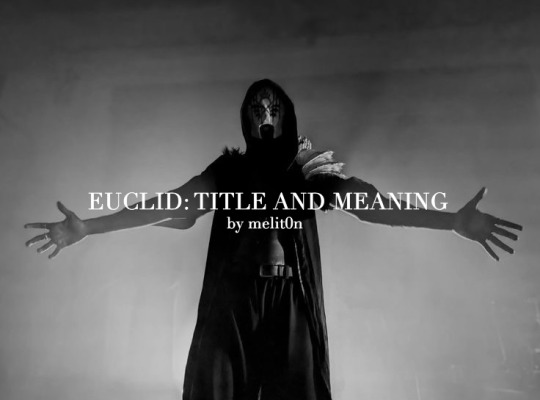
Let's start off with the basics. ‘Euclid’ is the anglicised version of the Greek name Eukleídes (Εὐκλείδης), mainly known via the ancient Greek mathematician Euclid of Alexandria, who is seen as the ‘father of geometry’, and most famous for his work on symmetry. Its general definition is something or someone who is renowned and or glorious (A) and the lesser known definition is something that is a copy of the same (B) (taken from Euclid’s ideas on symmetry), which we’ll come back to in a bit.
However, there is another Euclid in history that we’ll be referencing; Euclid of Megara. This Euclid, similar to our mathematician, was an ancient Greek Socratic (having been a pupil of Socrates) philosopher. I’ll be taking part of a text out of his Wikipedia article since his ideas have been explained thoroughly there.
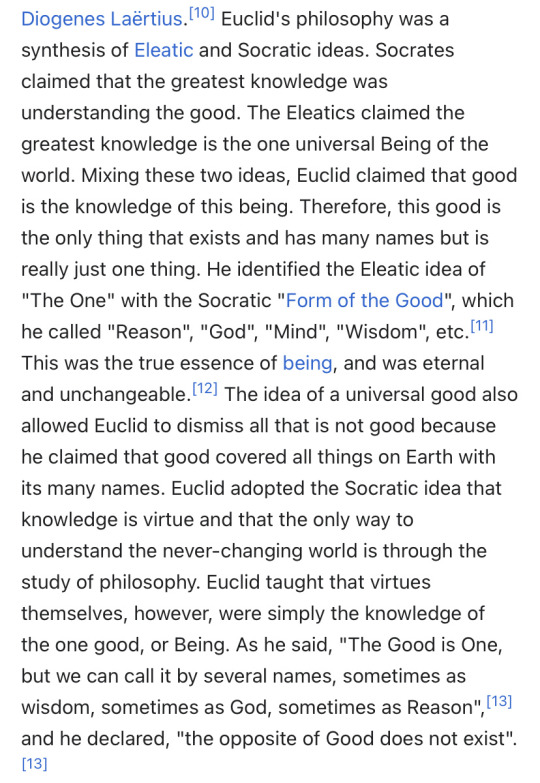
(we'll be coming back to him soon)
First off, this is an incredibly interesting choice of name for a song. Outside of someone's maths and philosophy class, this name doesn't exist to most, so the fact it's been chosen at all is intriguing.
Vessel has shown time and time again he enjoys sometimes elaborate references in his art, an example being chemistry and biology in TPWBYT (most notable would probably be ‘Telomeres’), so, I think it would be easy to say that, whether it be a reference to Euclid the Mathematician or Euclid the philosopher, that said reference is understood and intended by Vessel.
So, let's start with our mathematician, shall we?
What I find interesting about Euclid of Alexandria is that his life and existence outside of his work on geometry is almost completely unknown. There's almost nothing known of him, as a person, other than where he spent half of his career (Alexandria; Egypt, hence his title), where he may have studied (Platonic academy) and a general idea of when he lived (around 300BC). What is known about this insanely famous man who created the foundations of symmetry is incredibly barebones. People take Euclid at face value for his work, just like Vessel (both as an artist, and a character).
Further, we, as listeners, don't have much of an understanding of who Vessel is other than being a mouthpiece of a deity known as Sleep, someone once human now grasping at the threads of humanity and someone sharing some of his struggles in life (both with Sleep and unknown people). Like Euclid, he is barebones, we take him at face value; a vessel. He is both a mouthpiece for Sleep, a mouthpiece for his own emotions (obviously) and a mouthpiece for us. His experiences transcend being just his, due to his anonymity, therefore allowing us to connect and express our own experiences. It's music for the sake of music; expression.
Now, having talked through Euclid as a person, it's time to talk about Euclid and his symmetry. Symmetry in shapes is 'reflections, rotations, translations, and combinations of these basic operations. Under an isometric transformation, a geometric object is said to be symmetric if, after transformation, the object is indistinguishable from the object before the transformation- a copy of the same’. So, of course, this means shapes like squares, rectangles, parallelograms and circles. Circles are a representation of infinity, wholeness, unity and loops. What does Euclid do? Loop itself (starts and ends with B major, which also happens to be the same chord that TNDNBTG starts with), and loops the three albums together, musically and lyrically.
Now, onto Euclid of Megara.
Euclid was born in Megara, Athens and was a follower of Socrates (sneaking into Athens to hear him speak, and he was also present during his death). He is most known for his philosophy that good is the knowledge of simply being and that the opposite of good does not exist, aka evil. The Good is described to be a perfect, eternal, and changeless Form, existing outside space and time. A form of Heaven without a God.
This idea could be linked lore-wise with Sleep Token; Sleep could, in a way, be The Good literally. Bliss. Further, with the idea that there is no actual opposite of good, then how can anything be bad? How can Sleep, as a deity, have bad intentions if there is no actual evil?
So far, with these two notable figures in mind, we can perceive Euclid as one of two ways (and there are more ways to come). Euclid can be seen as quite literally being a form of symmetry; a parallel that Vessel lays his life on because it brings all of the produced albums, all of his stories, together. Or, we can think of Euclid as Vessel. This brings me to @euclidsvessel's post on their theory on Euclid; what if Euclid was Vessel’s name before he became a vessel?
The theory that Euclid could be Vessel’s old name is not only extremely insightful, but very plausible as well. They explained their points very well in their original post, and I don't want to repeat what they’ve already said, so I do implore you to go read that! It's not detrimental to needing to understand this post, but I highly recommend it. Despite this, I am here to both support their argument and bring my own comparison. Take a look at the cover art for Euclid:

Let me repeat the lesser-known definition of Euclid; a copy of the same. A clone. A replacement. Held in the right hand is the decapitated head of Vessel's old (2nd gen.) mask. Specifically, the one that covers his mouth; the version that relinquishes the most amount of humanity. The album art is a representation of change portrayed in a symbolically gory way. Beheading, depending on the era you’re working from, symbolises both vengeance as well as a form of purification. By cutting off the head, you remove any ‘unholy’ thoughts. It's also among one of the most horrific and humiliating ways of killing someone (since it was typically done publicly, and sometimes the heads were placed on spikes of battlements as a warning).
Furthermore, there's a theory that's popped up a couple of times, lore-wise, that Vessel is not the first person to be turned into a vessel of Sleep, and he certainly won't be the last. So, considering the literal album art illustrates a replacement of Vessel, I’d say that theory is pretty much confirmed. In conclusion, the album art can either be interpreted as how Vessel will eventually be discarded and replaced by another vessel, or how Vessel himself will change, for better or for worse; clawing out of his own skin to become “someone new”.
So, to compare the idea of Euclid being Vessel’s old name, and to create the third perception of what or rather, who, Euclid is, what if Euclid will be the eventual replacement for Vessel?
#I would like to mention that the idea of a 'Euclid class object's floated around Reddit theories for Euclid as well#said objects are 'anomalies that are either insufficiently understood or inherently unpredictable'#I didn't include this because it's from SCP and I thought it highly unlikely that it could be a refrence to that#but then again; a lot of the lyrics refrence hardware and un-understandable things so I thought I'd say something about it#masaive thank you to Nine for spurring me on to continue writing this and eventually post it with their theory post#just a very big thank you to everybody on ST Tumblr who post any analysis bits because you all inspire me#with that said#I hope these will be interesting for you all <3#sleep token#st#mel's rambles#euclid#euclid sleep token#sleep token analysis#vessel#vessel sleep token#tmbte#sleep token tmbte#hiding in here that I felt a bit like Hamilton writing these#'John Jay got sick after writing five...James Madison wrote twenty nine...Hamilton wrote the oTHER FIFTY ONE'#apologies to anybody who reads that lmao
60 notes
·
View notes
Note
kind of a hot take and maybe a bit offensive and blasphemous: confucianism was? is? kinda... off putting,, i find it weird that this guy existed in a point in time irl, and now we've come to think of him as a god figure?? he was real, and was probably a normal dude who got some different ideologies that people supported, and then now there's a religion. it's sus, not like muhammad from islam or moses from the bible, we have no tangible records that those people existed at all, or if they were of real people they dont have dates and times or documentation besides the scripture. perhaps this is something unique to china in the sense that their religions kind of have dates and that existence is not just confined to religious scripture if you know what i mean?? laozi, the founder of taoism, possibly exists in some accounts, and in others he is immortal, but its possible to think the guy existed.. idk sorry if this makes no sense to you.. i'm not even going to open the can of worms that is cultural minorities and their religions that i do not have the authority to even speak of knowledgeablely?? china is a melting pot of socio-cultural stuff i couldnt possibly understand without actually being there and i acknowledge that as an agonostic diaspora with one lone braincell that blasts rasputin all the time
actually wouldnt it be funny if elon musk started his own religion like confucius or whatever i think that would be funny i wouldnt call it a religion itd be a cult and an mlm simultaneously
This took a hot second to reply to because I went down oh so many an unnecessary side quest. But is it really a reply from me if I don't talk about something else instead?
--
I am going to put this in the nicest most neutral way possible because a) I got nothing going on at this particular time, and
b) to your credit, I feel like you could hear yourself in your head sounding dumb as hell but just decided to hit snooze on those alarm bells and sent me this ask instead of turning to google first:
confucianism was? is? kinda… off putting,, i find it weird that this guy existed in a point in time irl, and now we've come to think of him as a god figure??
Confucius (Kongzi) did not start a religion. Confucianism is a school of philosophy first and foremost. He may be somewhat mythologised as a major historical figure, sure, but his primary influence is that of a philosopher and as the "father of Chinese ethics". He is revered as a great thinker, not a god. Comparable example: Socrates.
Confucianism is not a religion the way you might be thinking about it. There may be folk religion/religious practices that go into it, as Confucianism in Chinese society is heavily blended with aspects of folk religion, Buddhism, and Daoism, but Confucianism is not like Christianity where the namesake was/is deified by its followers.
In fact, fun fact, this was so much so the reality that was a point of criticism against Jesuit missionaries in the Ming Dynasty and perhaps a contributing factor (in addition to fundamental culturally-based world view differences) for why the Jesuits failed so hard at converting the Chinese masses to Catholicism/Christianity; they would try to explain Jesus in terms of Confucius teaching, and in turn, Confucius, which those who rejected the Jesuit teachings found incredulous.
---
Side note time! when it comes to Confucius and what he said about religion/spirituality,he's often quoted as saying "敬鬼神而远之", "respect gods and demons/spirits from a distance", which, fun fact, Matteo Ricci (Jesuit missionary) uses in an argument to piggyback off the Chinese understanding of spirits to explain the Holy Spirit (i.e, the more important spirit to be worshipped who, unlike ancestor (spirit) worship, is the key to salvation) in his book "The True Meaning of the Lord of Heaven", written in Chinese. He points to the quote by Confucius as paradoxical because Confucius confirms the existence of spirits and encourages ancestor worship but also says to distance spirits, which, from Ricci's POV makes no sense if the point of ancestor worship is to curry favor with the spirits.
故仲尼曰:「敬鬼神而远之。」彼福禄、免罪非鬼神所能,由天主耳。而时人谄渎,欲自此得之,则非其得之之道也。夫「远之」意与「获罪乎天,无所祷」同,岂可以「远之」解「无之」而陷仲尼于无鬼神之惑哉?(source, 581)
So Confucius said: "Respect gods and demons/spirits from a distance". Happiness, position, and longevity and absolution [of sin] can only be handled by God. Yet contemporaries flatter [the spirits of ancestors] to obtain their [favor], but this is not the way to do it. This "from a distance" and "when you sin against Heaven, [there is] no one to pray [to]" are the same. How could "from a distance" and "there is no [gods and demons/spirits" trap Confucius in [the puzzle] that there are no gods or demons/spirits?
(^rough translation)
What I feel he takes out of context is that in the source of the idiom, Confucius is responding to a student who is asking him what the meaning of knowledge/wisdom/intelligence is. His full response is "务民之义 敬鬼神而远之 可谓知矣", "The meaning is to serve the people. Respect gods and demons/spirits from a distance—this could also be called wisdom". Confucianism generally holds that ancestor worship and similar rituals are necessary to society but that religious fanaticism and superstition should be discouraged. To Confucius, worship to spirits based on etiquette (which is respectful) are important to creating a stable and peaceful society. Devout belief/zealotry/fanaticism and indulgence in gods/demons/spirits/superstition is profane, so one should keep their distance and stick to rational respect for spirits (ritual). This is how Confucianism can actually be compatible with Christianity, although from Ricci's standpoint, he sees contradictions in Confucius because to him, ancestor worship to curry favor rather than worship to god IS the superstitious behavior and is blasphemous in the face of his god.
Fun food for thought aside, if you're wondering: Jesuits mostly got for milked for hundreds of years for their knowledge of things relating to science and math, which the Chinese considered as being part of knowledge that was once known but then lost in earlier dynasties due to political instability. Then ironically their favor began to decline when the Manchus instated the the Qing dynasty and in an effort to obtain more support from their Han subjects, adopted Confucianism philosophies more strictly.
---
Basically, most of your vague questions here could probably be cleared up if you read up more on what Confucianism actually is and what its relationship to Chinese society is.
I can understand how this might be confusing if you are diaspora but grew up agnostic and only have the vague framework of, let's face it, Christianity in western society to base your understanding of religion off of, but I don't think it's thaaaaat unique to China for historical figures to be mythologised, either as the center of religions, folk religions, folk lore/legend, philosophies, or religious philosophies. Siddhartha Gautama and Jesus of Nazareth, for example. The Catholic saints. (Edit: also, Muhammad did exist historically and there's decent evidence to suggest that Laozi did as well, though these were not their birth names most likely).
#text#answered ask#also elon musk is already basically a cult of personality#and unless he finds a magically unscathed new scripture in a burning tesla i don't see him becoming a religious founder any time soon#long post#孔子#religion#additional fact i forgot to add but won't edit in bc it's not that important: not only did manchu adherence to confucianism cause#the decline of jesuit influence,the pope of the time banned ancestral worship by chinese catholics which eventually led to the expulsion of#jesuit missions in china#and the decree wasn't reversed until like 200 years later#so they basically played themselves
495 notes
·
View notes
Photo
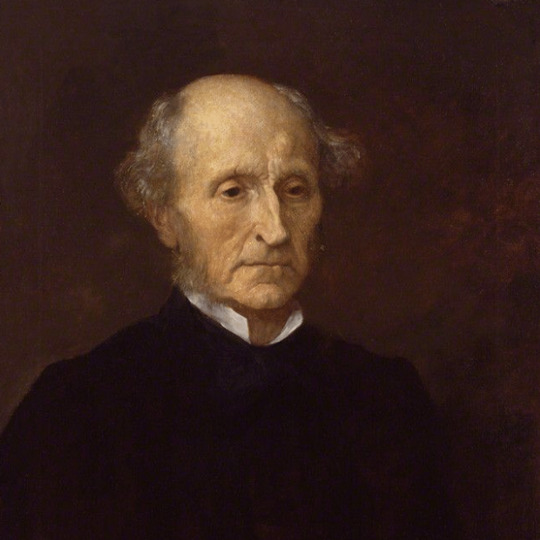
John Stuart Mill
John Stuart Mill (1806-1873) was a highly influential English philosopher of the Victorian Era. His writings were influenced by the Enlightenment thinkers and German Romanticism. Besides philosophical works, he wrote on mathematics, language, and logic. Well ahead of his time, he advocated the abolition of slavery and was a proponent of both children's and women's rights. However, he is best remembered for his essays on utilitarianism, a philosophy developed by Jeremy Bentham (1748-1832).
Life
Born on 20 May 1806 in London, England, John Stuart Mill was the son of the Scottish radical thinker James Mill. James had moved to London to promote Bentham's utilitarian philosophy. Through his father's use of the Socratic method, John was educated by James in the psychological and educational principles of utilitarianism. He was schooled in law, psychology, economics, mathematics, and logic. James Strangroom in his The Great Philosophers wrote that Mill's father's aim was to turn him into a calculation machine. Some believe James accomplished his goal. At the age of three, he read Greek, and at age eight, Latin. By the time he was 14, he had read most of the classic Greek and Latin texts in their original languages. Later, while still in his teens, he edited many of Bentham's unpublished manuscripts.
Like his father, at age 17, he began to rise through the ranks of the British East India Company, remaining there until it closed in 1858. He suffered a nervous breakdown when he was 20. Many believe his repeated bouts of depression were a reaction to the impersonal disciplined teaching of his father and the overwhelming domination that his father imposed on everything in his life. In his The Great Philosophers, Jeremy Strongroom wrote that Mill had been prepared for argumentation and analysis but received no training to help him cope with emotional moods. Luckily, his newfound interest in culture, theater, and the works of English poet William Wordsworth (1770-1850) helped him escape his depression.
In 1852, he married a long-time friend, Harriet Taylor, two years after the death of her first husband. She proved to have a significant influence on Mill as his foremost consultant and critic. She died in 1858. Seven years later, he became a member of Parliament (1865-1868) serving only one term. Mill died on 8 May 1873 in Avignon, France. Among his major works are A System of Logic (1853), On Liberty (1859), and The Subjection of Women (1869).
Continue reading...
22 notes
·
View notes
Text

Word day 22 March Moody Microfics || Surprised|| @jilymicrofics
Read A Particularly Exquisite Vegetable (day 22 Surprised) on ao3 or below the cut.
A Particularly Exquisite Vegetable
The Greengrasses were popular and they enjoyed company as much as their guests enjoyed their feasts. So the whole of the Hogsmeade Assembly gladly accepted the dinner invitation to celebrate the engagement of Miss Lyra Bones to the Greengrass's heir.
Lily found herself seated next to Mr Snape. She was not happy about it. His condescending and frankly rude remarks after she’d literally saved his skin from a sure beating by Mr Potter and the younger Lord Black, still stung.
Really, having heard some of the abhorrent opinions of the man, she would not have bothered, but at the time she had not known him well. She had simply stepped up for a man, who looked to her, in physical appearances, to be the weaker party.
This evening she was no longer surprised when he stated his concerns for the felicity of Mr Greengrass, since he considered Miss Lyra to be in possission of several serious defects of temper; she was headstrong and had a foolish interest in inappropriate subjects such as Philosophy and the running of her future husband’s estate.
Lily suppressed the urge to quote Socrates to him or mention how her father used to discuss every decision about his tenants with her.
When she pretended he wasn't actually here at all, she found Mr Snape to be less intolerable.
Mr Snape, however, did nothing to make it easier for her to ignore him.
“The potatoes are without a doubt the best I’ve ever tasted. Surely, you agree, Miss Evans?”
“Hmm... I suppose they are…well done,” she answered, wondering if the man was a secret potato fetishist. He seemed to be happy enough with her answer so she let her mind wander to more palatable subjects. Like Lord Potter, who she now noticed, sitting only a few places to her right.
Meanwhile, Mr Snape kept his inane and one-sided conversation going.
“I’m proud to tell you I’ve been personally invited to the Deed’s club. Of course, I am not about to get blackballed, unlike those two scoundrels, Lord Potter and Black.”
Lily looked up at Lord Potter at that, she wondered if he could hear what was being said about him. The thought almost made her speak up against Mr Snape’s disparaging remarks. She didn't want Lord Potter to believe she was in agreement with Mr Snape, but he was not to be silenced, if anything he seemed to have found new energy to unleash his next words.
“I realise that you, my dear Miss Evans, are well aware of the success I am about to become. Which brings me to a delicate and private matter. Lord Riddle, has advised me to find a suitable wife, a woman such as yourself, to be the proper and dutiful mistress of my home.”
Lily choked on her potato.
#moody micro fics march#day 22#surprised#regency au#Lord Potter#Miss Evans#Jily#james potter#lily evans#jily fanfiction
18 notes
·
View notes
Text
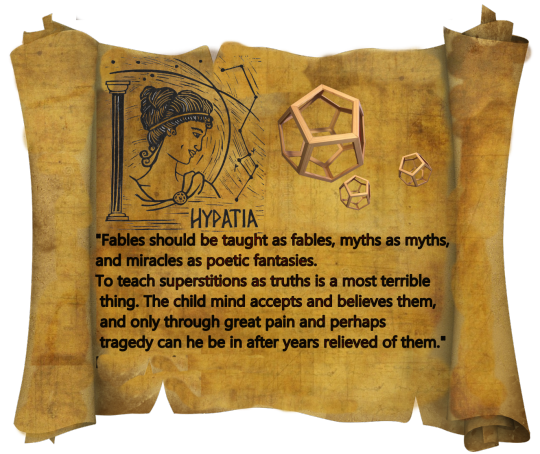
The Roman state would eventually give free rein to Christians and their extremist views, who destroyed pagan shrines and images, or who committed violence against pagan leaders. They attacked people at pagan services and destroyed their temples as a means of enforcing Christianity on the people. Arson was a favorite tactic. From the late 300s on, monks stand out as the primary aggressors in the battle to suppress pagans. Even Christian documents describe them as violent and crime-prone, beating people they considered sinful, stirring up sectarian strife.
The pagan Eunapius remarked that these monks looked like men but lived like pigs, “and openly did and allowed countless unspeakable crimes.” [Eunapius, 423] He added bitterly, “For among them, every man is given the power of a tyrant who has a black robe and is prepared to behave badly in public; they are not above murder.
Hypatia was born around 370 AD in Alexandria, Egypt. From a young age, she showed extraordinary intelligence, which is why her father taught her the study of mathematics, geometry, astronomy, and above all, philosophy.
Hypatia believed that culture was a good that belonged to everyone, not just a few privileged individuals, which is why she often held her lessons in the street, among the common people, just as Socrates did. The entire city loved and honored her, while the authorities often consulted her on public matters.
She spoke, disseminated knowledge, opened minds, but above all, she refused to submit to the Christian system that wanted her subdued, as a woman. And this was intolerable for the Patriarchal Christans.
It happened that one day, Bishop Cyril passed by Hypatia's house and saw a large crowd in front of her door. When he asked the reason for all the commotion, he was told that this was the house of Hypatia: a great philosopher who had earned the respect of the entire city through her genius and intelligence.
Bishop Cyril, consumed by envy, began to plot her murder. Cyril incited the Christians against Hypatia, accusing her of being a witch, a pagan. Bishop Cyril’s flock lay in wait to surprise Hypatia, as she returned home. They surrounded her, dragged her with violence to a church; and after tearing off her clothes and brutally beating her, they killed her using shards and then burned her remains.

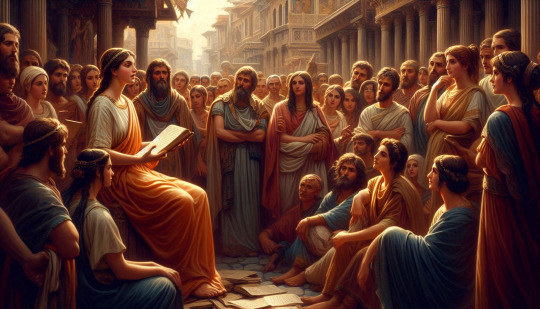
12 notes
·
View notes
Text
Rifftrax Sentence Starters
“______, didn’t I dispatch you to hell earlier?”
“ ______, shut up forever.”
"Alright. That does it. I officially have no idea what we're looking at, why we're here, or even who I am anymore."
“And I pray that I never have to emote any more than I just did. I'm exhausted.”
“And if you're ready, _____, may I offer you a wide-awake nightmare?
“Aw man, I thought we could trust the slimy loser.”
“Being a creepy evil creep is a reward in and of itself.”
“Bland? I mean, honey? Can I make you some bland milk? I mean, warm bland? I mean, warm milk?”
“Careful, they might miss at you.”
“Die! Die in a fire! Live again and then die!”
“Did you guys just see that or has my brain fully melted?”
“Do you think you can do me the teensiest favor and just kill me now?”
“Feels like an NPR audio essay is about to break out.”
“Forgive me, Father. I killed like eight guys today.”
“Fuck you. Pay me."
“Having knowledge about things is not really my specialty.”
“He died as he lived: looking dumb as Hell.”
“He has all the fighting skills of a sock monkey."
“Hell is other people and stuff.”
“I’m condescending for no reason, got it?”
“I've tried nothing—And it's not working!"
“I can’t answer your question because that would acknowledge you exist.”
“I can’t live with myself knowing there’s something out there I haven’t murdered.”
“I don’t want to oversell it, but it will fill you with sadness.”
"I find words difficult because I can't punch them."
“I have a two part question. One, will I ever feel joy again? Two, what did I do to deserve this?”
“I hope you like really tough burnt meat and shitty scotch.”
"I love it when a plan sort of slowly congeals together."
“I thrive on your ignorance.”
“I tripped and fell up five flights of stairs and landed here.”
“Is your torture basement even up to code?”
“It’s not what you said; it’s that you exist.”
“It irritates me too that I can defy logic, time, and physics."
"It is pleasant to be happy because it increases our amount of gladness."
“Let's carpe diem and mumble and mope like we've never mumbled and moped before!”
“Mind if I dial up the gay?”
"Never have I cared so little about so few for so long."
“Nothing calms a kid more than a poster of a deranged clown.”
“My philosophy is to see how many Pop-Tarts I can eat in two minutes.”
“No, don’t, ____, please! Seriously! I will kill all your enemies! Please!”
"No good story ever starts with ‘so there I was, pouring gasoline all over the dead girl’s body.’”
"Oh good. Something else for the Gallery of Things That Should Not Be."
“Oh, thoughtless sociopath, you’re my best friend.”
“Okay, so I’ll take that ominous cryptic answer as a firm yes.”
“Our hero— again, fighting like a sociopathic four year-old.”
"Please don't ruin this moment by surviving!"
“Rush in blindly! A plan can only hinder us!"
"Screaming? Laughter? At this point, what's the difference?"
“So where do you think you’re gonna dump my body?”
"So…You give up here often?"
“Society as we know it would disintegrate if people knew the truth about whatnot.”
“Thank you, most boring sounding person in the world.”
“That’s a very friendly murder threat.”
“That sounded a lot more menacing and less gay in my head.”
“This is my bullshit lecture!”
“Wait a minute, I thought you said ‘pass the time,’ not ‘destroy all hope in the universe.’”
"We are reconciled now through the cleansing power of violence."
“Well, that was neither fun nor interesting, but at least it gave us no new information.”
“Well, time to pretend I know stuff.”
"Well, whoopty-shit."
"Welp... Forgone conclusion ain't gonna forgone conclude itself."
“Who can resist an asshole?”
“Women, right? Always like, ‘This seems fatally stupid!’ Blah, blah, blah.’”
“Yeah, I do feel my own mind drifting through thoughts of Socrates—in that I want to drink hemlock and die.”
"You're a lying liar who lies! You lie!"
“You're not allergic to severe acid burns, are you?”
“You taste like libertarianism and cigars.”
“Your evil is reassuring.”
“Your violent, misogynistic criminal vibe lets me know I can trust you.”
#rp meme#sentence starters#rp starter#meme#memes#murder ///#violence tw#chaotic sentence starters#rp prompts#roleplay prompts
26 notes
·
View notes
Text
philosophy is so fucking funny, like you go all the way back to the ionian school of pre-socratic philosophy and its like everyone is out here changing up what they believe the world arises from.
Thales of Miletus believed all things are derived from water because of moistness.
Anaximenes believed everything is derived from air.
Heraclitus believed all things are derived from fire.
straight up just like switching out what came before.
(lmao i know it’s more complicated than that and they had solid reasoning, but it’s funnier to think about them just like being like “fuck you philosophy father!! the archae is this!!!”)
i love philosophy so much lmao.
#archae#philosophy#philosophy guy loves giraffes in my podcast#anaximander#Anaximenes#heraclitus#thales of miletus#socrates#pre-socratic#ionia#water womb
10 notes
·
View notes
Note
On your advice I think Rev should jab tyrest in the head hole with their crown
I'm trying to figure out his end, poetic justice style.
Tyrest is gonna die at the hands of his own obsession.
I have ideas running in my head, but I'm leaning into Pharma's involvement in some way. Either directly or indirectly, through his teachings, to synthesize a highly potent toxin based on hemlock and Aconitum.
Hemlock is associated with death and danger. In Ancient Greece, this plant was used to execute condemed prisioners, the most famous one: Socrates -considered by many to be the father of Western philosophy.
Aconitum has multiple names: Aconite, Monkshood, Wolfsbane, and the Queen of Poisons. It's associated with caution, death, and misanthropy; as well as the Underworld with Hecate and Cerberus. It was believed to be an important ingredient for flying ointment for witches in the Medieval period.
Like many toxic plants, these two also have medicinal uses, so it's definitely under Pharma's specialty.
Tyrest thinks he's getting a religious experience. No, he's dying by his own Revelation.
Tracks I've been listening to on replay for this series:
No Light, No Light by Florence + the Machines
Breath of Life by Florence + the Machines
Broken Crown by Mumford & Sons
Sweet Nothing by Calvin Harris
Saints by Echo
Providence by Poor Man's Poison
Criminal by Fionna Apple
#ask#transformers#transformers idw#idw#mtmte#tyrest#reader insert#pharma#i will not speak of your sins#major character death#my thoughts#my writing#greek mythology#humanformers#humans into cybertronians#am i leaning hard into religious symbolism and imagery#yes yes i am#tyrest will choke on it#more like croak
17 notes
·
View notes
Text
The Emergence of Herodotus
"THE EMERGENCE OF HERODOTUS
Abstract: The brilliance and sophistication of Herodotus’ work have rendered the origins of historiography obscure to us: he had extinguished his predecessors. In truth, he must have been influenced by a number of minor genres, some of which seem barely respectable, while some, like Attic comedy, positively aimed to downgrade and ridicule their subjects: the Socrates of Aristophanes’ Clouds, and the Euripides of several of his plays are obvious examples. Scholars have often been misled, by Herodotus’ great talent and serious reputation, to disregard, or even to deny, his use of such sources. We may reflect that it is, indeed, a very fortunate fact for us, and for our understanding of fifth-century history, that Herodotus was less fastidious, more adventurous, and much more omnivorous, in his collection and selection of his material.
Before the appearance of writing, the literature of Hellas, like that of
many other peoples, was—of course—a literature in verse. Prose,
which is verse’s younger sister, came into existence only later, and the rise of prose narrative was gradual. As for poetry, it offers us, from the very beginning, works of the utmost perfection. The epic singers who preceded our Iliad are like the heroes who lived before Agamemnon: they have left no explicit trace behind them—apart, that is, from the dubious inferences that we can read into the poems which actually exist, and which can actually still be read. Lyric poetry, from what we see of it, appears first with the work of Archilochus; even Attic tragedy, which was a complex form with a definable
and datable beginning, has somehow contrived to lose almost every trace, and (indeed) all memory, of the dramatic pieces which preceded the work of Aeschylus.
Prose, too, has also managed—much more completely than we should have wished—to abolish most of its own earliest traces. The great historian Herodotus, the ‘father of history’, has put his predecessors and contemporaries thoroughly, and lastingly, in the shade; and yet we can still say something about them, and the position is a little more favourable for enquiries into the origins of prose writing generally. Herodotus’ historical work is, in fact—like Homer’s—extremely subtle and varied. Its ingenious affectation of naïveté has deceived some scholars, both ancient and modern;
a fact that has not prevented, and that certainly should not prevent, some acute analyses of the origins and the creation of the work. What, then, were the origins of historiography?
In his widely embracing book, Die griechische Geschichtsschreibung, Kurt von Fritz 1 derives the advent of historical writing from five factors: the adoption of a system of writing that was simple and generally accessible; the appearance of a new kind of geography; the awakening of a new critical spirit, perceptible equally in philosophy and in astronomy; the influence of some oriental writings, which became accessible, thanks to the rise of Persia; and the
breach in continuity, which allowed the heroic period to shine forth in a clearer light, followed by a darker period, which did not live on in memory at all, and which could not be made into history.
Peter Brunt, in his review of the book of von Fritz,2 points to a surprising omission in this list: that of the Homeric poems.3 In Brunt’s epigrammatic formulation, ‘the writing of history was born of the epic, from a union with the spirit of the Ionian enlightenment’. He draws attention particularly to the importance of the speeches, and also of the conversations, in Herodotus’ work: the influence of Homer is here obvious and very substantial. It can be added, that Herodotus’ interest in what are called the ‘great deeds of men’, in the κλέα ἀνδρῶν in the words of Homer, in ἔργα µεγάλα τε καὶ θωµαστά, in
the phrase of Herodotus in his prologue, is a central theme of the epic.
It is to be observed, however, that the epic, through its combination with the Ionian enlightenment, aimed to glimpse the light of the whole human world, to understand another world, and to explain how the events of its history really occurred, and how they were really caused. There was, indeed, something radically new coming to birth. Was the pregnancy, we wonder, a long one? Was the delivery very difficult? To put the question in another way: how did the birth occur, and what contributed, to make it possible in the first place? In this paper, I shall put forward the view that we must see Herodotus as influenced by a number of less ambitious minor genres, the consideration of which can help to bring his work into relation to
the general culture of his time, and which can play a part in explaining the origins of a work which has been allowed, very often, to remain isolated and rather mysterious."
Jasper Griffin "The Emergence of Herodotus", Histos 8 (2014), 1-24 (abstract and opening paragraphs)
The whole paper can be found on:
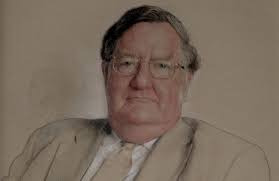
Jasper Griffin FBA (29 May 1937 – 22 November 2019[1][2]) was a British classicist and academic. He was Public Orator and Professor of Classical Literature in the University of Oxford from 1992 until 2004. Source: https://en.wikipedia.org/wiki/Jasper_Griffin
4 notes
·
View notes
Text
Socrates Hated Democracy
Democracy and ancient Athens were once held in high regard, with the Parthenon symbolizing democratic values. However, it is interesting to note that philosophy, one of ancient Greece’s greatest achievements, was skeptical of democracy. Socrates, the founding father of Greek philosophy, expressed his pessimism towards democracy in Plato’s Republic. He compared a society to a ship and questioned…

View On WordPress
1 note
·
View note
Note
Idk if this makes sense but why were people so smart in like the ancient times? Like Plato and people like that. Was it just because there was nothing else to do but study? Why don't we have people like that anymore that are coming up with these crazy ideas that define everything? I know this sound stupid lol pls forgive me it's a real question.
This is a really interesting question! I love it. It has a couple of answers, but basically the answer is just that they weren't.
The first issue with the idea that people were smarter in the past is suvivorship bias. The accounts that we have from 2400 years ago are the ones people thought were valuable enough to preserve. And even then, a lot of that work was lost- for example, all we know about the teachings of Socrates come from Plato, who was his student, instead of from written sources, which were lost to history. That means that a lot of accounts of average people or even less-than-brilliant people were lost to history, and so what's left for us to read is the best of the best. It's kind of like basing your entire idea of Americans off of the US's 398 Nobel prize winners. The average Athenean was not super well educated, and philosophy was considered a discipline for aristocrats who didn't have other things to be doing.
The second is that there was less information to know. Some people say that Aristotle was the last person to know all of the knowledge there was to know. But he could only do that because world knowledge was pretty limited. Because information builds on itself, to understand any new information, you need to know everything that came before. Now, it would take about 31.58 years straight just to read everything on English language Wikipedia, and it would take much longer than that to actually understand it.
Along with that, our knowledge has become much more specialized. We've adopted kind of an "assembly line" approach to knowledge, where many people have very specific knowledge but not a lot of people understand the entire process or have general knowledge. True polymaths like Plato are less common than they used to be (although we're still here!). But that said, most people who have a US university education do go through "general education" classes that make sure they have some foundation in all areas of knowledge.
The problems that we're solving now have also become more complex, meaning that it's harder for a single person to create a paradigm shift on their own. Much of the work that's being done in science and technology right now can't be done without the aid of multiple researchers and computers, just because there are too many computations that need to be done. These days, teams typically make those kind of discoveries as opposed to individuals. A good example of this is the internet. It's arguably one of the biggest disruptors ever to occur. It changed how every aspect of our lives work for about 5.03 billion people. But it was an iterative process created by many different teams across the world working together as opposed to just one person.
But that said, we absolutely do have people who are coming up with crazy ideas that redefine how we interact with the world. A good example is Albert Einstein; his theory of relativity totally changed how we understand our universe. Science has these kind of "paradigm shifts" fairly frequently, but the average person doesn't necessarily hear about them or understand them. Even with that internet example, Tim Berners-Lee is often thought of as the "father" of the internet because he created the World Wide Web while working at CERN.
Finally, I think an issue is the voices that we elevate. We've stopped listening to and elevating the voices of philosophers (like Plato) and have begun elevating the voices of people without any specialized knowledge at all (like celebrities). As a result, philosophy has become something of a niche subject that acts as an ouroboros eating its own tail instead of a practical subject that informs the way people live their lives. That's actually one of the major reasons why I left academic philosophy and prefer to do things like run this blog instead- it reaches people. There's a larger conversation we can have about this point if you're interested, but basically because our current media landscape is so large and doesn't incentivize nuance, it's hard for anyone with a (actual, implementable) big idea to be heard. They tend to get drowned out by people who have adopted the veneer of being "disruptive", but who are more hype than they are substance.
5 notes
·
View notes
Text
Thinking about things Alexander the Great did and having an epic caesar moment like "this guy was my age and he was already legendary and undefeated in battle and king of the largest empire that had ever been, obviously i am nothing and he is just a different and better type of human." But also... He did literally inherit the position from which he was able to rise to such greatness. He didn't just wander out of the fields one day, a nobody, like "hello my name is Alex i'm very beautiful and blonde here's my resume please allow me possession of your everything"
And he was still great. But so many people could have been a Great if they had been born to a position high enough to achieve it, because it's luck as much as it is greatness. That doesn’t negate his accomplishments but puts them into perspective.
It’s like how we think about the first philosophers and how we have this idea that only these genius men could have come up with these thoughts, that only Socrates Plato Aritstotle Lao Tzu Confucius Thales Democritus Diogenes Zeno etc could have thought these things. Which when it comes to specifics is probably true. But then you think about how many people could have made genius contributions to philosophy but were unluckily born as women, or who got sick and died too young, or who just didn’t live in a stable enough time and place to be free to philosophize. So yes these philosophers were geniuses of their time and their contributions are enormous and inexhaustible, but they were lucky to be born as they were, when and where they were, and to receive the benefits of a world they did not build, the better but still very imperfect world which, by accident, suited them. And which they inherited from the faceless millions who toiled for centuries and on whose shoulders rests all progress. Just like Alexander inherited a kingdom his father made fit to conquer the world.
And if the philosophers we know hadn’t been so lucky and we missed them then someone else would have taken their place. The world would be different but it’s a matter of luck that the world is the way it is anyway. We all have to come out of it. And honestly most of us (arguably all of us) are lucky to live in this newest incarnation of the world, where our origins matter less than they ever have. Like the world suits more people, barriers are easier to cross, greatness is easier for the humble-born and technically unsuited to achieve (not always possible in the same way but possible where it once wasn't). We’re all part of history and there’s only so much we can do with what it gives us but we can do a lot more now than ever before. We just can’t be Alexanders. And when u think about it if Alexander were born today neither could he🤷🏼♀️
#also remembered he was described as short so i looked it up and he was like 5 feet tall#a win for short kings#kennapost
2 notes
·
View notes
Text
Here's a list of 20 of the greatest thinkers of all time, along with details about their contributions and years of life:
1. **Socrates (470/469-399 BC)**
- **Contributions**: Founder of Western philosophy; developed the Socratic method, a form of cooperative argumentative dialogue to stimulate critical thinking and illuminate ideas.
2. **Plato (428/427-348/347 BC)**
- **Contributions**: Student of Socrates; founded the Academy in Athens; wrote "The Republic," which outlines his vision of a just society and discusses the theory of forms.
3. **Aristotle (384-322 BC)**
- **Contributions**: Student of Plato; made significant contributions to numerous fields, including metaphysics, ethics, politics, and biology; wrote "Nicomachean Ethics" and "Politics."
4. **Confucius (551-479 BC)**
- **Contributions**: Chinese philosopher who founded Confucianism; emphasized moral integrity, familial loyalty, and social harmony; wrote "The Analects."
5. **Immanuel Kant (1724-1804)**
- **Contributions**: German philosopher known for his work in epistemology and ethics; wrote "Critique of Pure Reason," which explores the limits of human knowledge and "Groundwork of the Metaphysics of Morals."
6. **René Descartes (1596-1650)**
- **Contributions**: French philosopher and mathematician; known as the father of modern philosophy; famous for the statement "Cogito, ergo sum" ("I think, therefore I am"); wrote "Meditations on First Philosophy."
7. **Friedrich Nietzsche (1844-1900)**
- **Contributions**: German philosopher known for his critique of traditional moral values and religion; introduced concepts such as the "Übermensch" and "eternal recurrence"; wrote "Thus Spoke Zarathustra."
8. **Sigmund Freud (1856-1939)**
- **Contributions**: Austrian neurologist and founder of psychoanalysis; developed theories on the unconscious mind, repression, and the significance of dreams; wrote "The Interpretation of Dreams."
9. **Karl Marx (1818-1883)**
- **Contributions**: German philosopher, economist, and political theorist; co-authored "The Communist Manifesto" with Friedrich Engels; developed the theory of historical materialism and critiqued capitalism in "Das Kapital."
10. **John Locke (1632-1704)**
- **Contributions**: English philosopher known as the father of liberalism; his ideas on natural rights and government influenced the Enlightenment and modern political thought; wrote "Two Treatises of Government."
11. **Jean-Jacques Rousseau (1712-1778)**
- **Contributions**: French philosopher and writer; his ideas on education, politics, and society influenced the French Revolution and modern political and educational thought; wrote "The Social Contract" and "Émile."
12. **Isaac Newton (1643-1727)**
- **Contributions**: English mathematician and physicist; formulated the laws of motion and universal gravitation; made significant contributions to calculus and optics; wrote "Principia Mathematica."
13. **Albert Einstein (1879-1955)**
- **Contributions**: German-born theoretical physicist; developed the theory of relativity, fundamentally changing our understanding of space, time, and energy; famous for the equation E=mc².
14. **Thomas Aquinas (1225-1274)**
- **Contributions**: Italian Dominican friar and theologian; synthesized Aristotelian philosophy with Christian theology; wrote "Summa Theologica," a cornerstone of Scholasticism.
15. **David Hume (1711-1776)**
- **Contributions**: Scottish Enlightenment philosopher known for his empirical approach to epistemology; his skepticism about human understanding and natural religion; wrote "A Treatise of Human Nature."
16. **John Stuart Mill (1806-1873)**
- **Contributions**: English philosopher and political economist; advocate of utilitarianism, liberty, and women's rights; wrote "On Liberty" and "Utilitarianism."
17. **Michel Foucault (1926-1984)**
- **Contributions**: French philosopher and social theorist; explored the relationships between power, knowledge, and social institutions; wrote "Discipline and Punish" and "The History of Sexuality."
18. **Simone de Beauvoir (1908-1986)**
- **Contributions**: French existentialist philosopher and feminist; her work "The Second Sex" is a foundational text in feminist theory; explored the construction of gender and women's oppression.
19. **Bertrand Russell (1872-1970)**
- **Contributions**: British philosopher, logician, and social critic; contributed significantly to logic, philosophy of language, and analytic philosophy; co-authored "Principia Mathematica" with Alfred North Whitehead.
20. **Ludwig Wittgenstein (1889-1951)**
- **Contributions**: Austrian-British philosopher who worked primarily in logic, philosophy of mathematics, and philosophy of language; wrote "Tractatus Logico-Philosophicus" and "Philosophical Investigations."
These thinkers have significantly shaped various fields of human knowledge, from philosophy and politics to science and psychology, leaving a lasting legacy on the world.
1 note
·
View note
Text
Daylight savings time more'n minute effect on me
In 2024, daylight savings time will begin at two o'clock ante meridiem on Sunday, March tenth. That will mean losing an hour of precious sleep and moving the clocks (around your house, and sundry frequented places) forward one hour, though your cell phone, computer, and television plus other electronic devices will likely automatically adjust. The sun will appear to rise and set an hour later.
Father time evinces spectacular robustness despite weathering setback of countless finagling representation viz Chronos (/ˈkroʊnɒs, -oʊs/; Greek: Χρόνος, [kʰrónos], "time"), also spelled Khronos or Chronus, is a personification of time in pre-Socratic philosophy and later literature. Chronos. Personification of time. Time Clipping Cupid's Wings (1694), by Pierre Mignard. Symbol.
Though crafted a few years back
jet lag effect affects yours truly
twice each year when schedules
within body electric
such as circadian rhythm
dislocate psyche
analogous to seismic shift
NOT attributed to global warming,
nor aeronautically bound sky high,
but linkedin to hour hand
on analog clock
set ahead or behind one hour.
Just about a bajillion moments ago
(from date/time
I wrote these words),
a dawning realization
arose within this sol son begat
from ma late mother
and (initial commencement
of this poem) while
then octogenarian widower father,
lived at Normandy Farms
Senior Community
in Blue Bell, Pennsylvania
(he since passed away
October 7th, 2020)
oh... no nothing cat
tuss strophic, boot
merely the revelation,
how fist bumping dee clocks
an hour hand ahead
remembered by dat
dog gone refrain
spring ahead, and fall back,
this unemployed chap
doth down play eclat
attests that his quotidian rising
schedule minimally affected
holed up here
in Highland Manor named flat
roomy enough for thyself, the Missus,
and buzzfeed ding fruit flies
each approximately the size of a gnat
a minor nuisance, though tolerable
within this appealing habitat,
where minor inconvenience experienced
by this Schwenksville, Pennsylvania resident
cuz as a recipient
of social security disability
(social anxiety) this psyche didst get rent,
which fixed (unearned) income budgeted
and predominantly costs
of living money spent
hence no need to arise
bright tailed and bushy black eyed,
pea yon sought freedom akin
to folks camped out in a tent,
which exemption immunizes
this doodle ling middle aged
muddle brained chap subjected to ranting
courtesy early morning drivers,
who angrily, frenetically,
and splenetically rant and vent
thus, the tendency, piquancy, and lunacy
to twitter (for the Yardbirds),
and keep company
with night owls, who went
a hooting for all the world wide web
to hear, whence dawgs Bach
the exact number of hours, yet oblivious
to the tight rigorous
tenon mortised schedule
manned by Mister Clock,
essentially foisting on Bread Winners,
an abstract artificial construct spurring
madcap commuters
to scurry in the rat race,
lest tardiness could cost
more than paycheck
(to ap pier with permanent dock
hue ment aye shun),
an unwonted blot add hoc
king worry about getting canned -
i.e. on permanent furlough,
perhaps forced into a life of crime,
yet if caught...
wasting away in a jail cell
as warden turns the lock
one redeeming factor,
would offer opportunity to mock
management, and more pertinently
mandate to rock
and roll to the incessant muted,
rhyme without reasonable schlock
yet devastatingly loud tick tock
analogous to stir fries
noisily prepared in wok.
0 notes